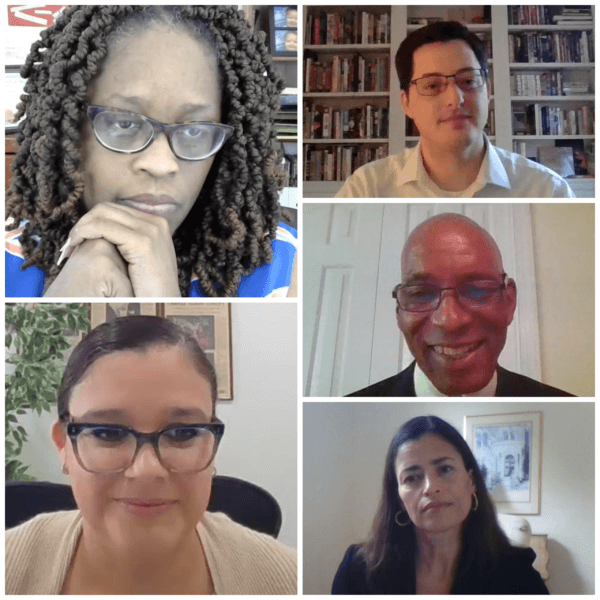
Summer Forum 2021: Serve Those Living in Poverty Through Pro Bono
By Amelia Patrick
The second session of our 2021 Summer Forum, held on June 10, featured our Poverty Law practice area panel. This panel highlighted the continuing legal needs of those living at or below the federal poverty level, especially after the pandemic’s disruption of the economy and effects on individual lives. The most prevalent poverty law issues are family law, housing law, public benefits, and debt collection, among a host of other issues. Our panel discussed pro bono opportunities in these areas and how lawyers in the DC area and across the nation can also get involved.
The panelists included:
- Tracy Goodman, Director of Children’s Law Center’s Healthy Together
- Ted Howard, Pro Bono Partner at Wiley LLP
- Keeshea Turner Roberts, Adjunct Professor and Supervising Attorney of Howard University School of Law’s Fair Housing Clinic
- Bradford Voegeli, Director of Private Attorney Involvement at Neighborhood Legal Services Program
The panel was moderated by Debbie Cuevas Hill who works as a bilingual Senior Staff Attorney in the Consumer Advocacy and Home Preservation Practice at Legal Counsel for the Elderly.
Tracy began the session by describing her work with the legal issues that negatively impact children’s health. These efforts include ensuring kids with disabilities and special needs receive proper school accommodations and holding landlords accountable for housing code violations that adversely affect a child’s health and safety. Tracy sees new cases daily involving families needing legal aid in areas of family law, special education, and housing. She highlighted multiple ways that lawyers and law school students can get involved with this work. Law students can be especially helpful in these cases. Students interested in pursuing pro bono work can contact their school’s public-interest office for more information.
Law school clinics are another great way law students can work on poverty law issues. As the Supervising Attorney for the Fair Housing Clinic at Howard Law, Keeshea oversees students involved in a wide variety of housing issues, such as violations of federal and local HUD rules, advocacy for community members in relation to housing, and eviction defense. As Keeshea stated, there is more than one way to advocate and give back to the community. She stressed that you do not have to be a licensed lawyer to take part in housing pro bono work. There are opportunities for law students and nonlawyers to engage in pro bono policy advocacy and direct client service through organizations across the country.
Brad comes at this work from a different direction. He engages law firm lawyers in his organization’s work in a variety of areas, including family law and housing discrimination. As the director of pro bono programs, he works to identify new areas that need legal aid and then connects lawyers to those opportunities. Specifically, Neighborhood Legal Services Program has opportunities for individuals at every step in their legal career, including opportunities for law students. Their internship program is another way for law students to become familiar with their work locally, and there are similar organizations across the country that can provide c0mparable experiences. In addition to this specific opportunity, Bradford offered some general advice for those who want to incorporate pro bono work into a law firm career: research the firm, ask about the firm’s pro bono commitment and find out if you will get one-to-one billable credit for pro bono hours. You want to identify the firms with a strong commitment to pro bono and the will to put that commitment into practice.
At Wiley, Ted oversees all of the firm’s pro bono work in collaboration with their pro bono committee. At the same time, Ted is invested in his own full-time pro bono portfolio. His cases include civil rights class action cases, immigration cases, women’s healthcare rights cases, and working with the ABA standing committee on Legal Aid and Indigent Defendants. When talking about how other lawyers can get involved in pro bono work, Ted emphasized the need across the country due to the pandemic and discussed how to identify where the need is greatest. For example, the ABA created a COVID-19 Task Force, which began as a network to identify pandemic-related legal needs and is now a resource for finding pro bono work in general. The network also provides opportunities for remote representation, so lawyers and law students can assist from anywhere.
No discussion of pro bono work in this area is complete without viewing it through a racial justice lens. Many of the issues faced by individuals living in poverty disproportionally affect black and brown people. As a result, racial equity work is a key component to addressing these legal needs. As Ted explained, one could argue that all poverty law work is racial justice work because the overwhelming majority of people in need of pro bono legal services are people who reside in communities of color. Debbie agreed that over 90% of her work is also with people from communities of color, which highlights the unfortunate realities of systematic racism in the U.S. Keeshea and Brad noted that housing discrimination and housing justice, in particular, are affected by systematic racism. Ted shared how he and pro bono colleagues contributed to the racial justice movement by creating the Law Firm Antiracism Alliance of more than 280 law firms. These law firms have signed a charter that recognizes that there are systemic racism issues in the U.S. which these firms are committed to attacking and changing. By taking part in pro bono work in this area, lawyers and law students anywhere can be part of the movement towards racial justice and providing equal access to justice for all.
Check out the video recording here.
Amelia Patrick is the 2021 Washington Council of Lawyers summer intern.






